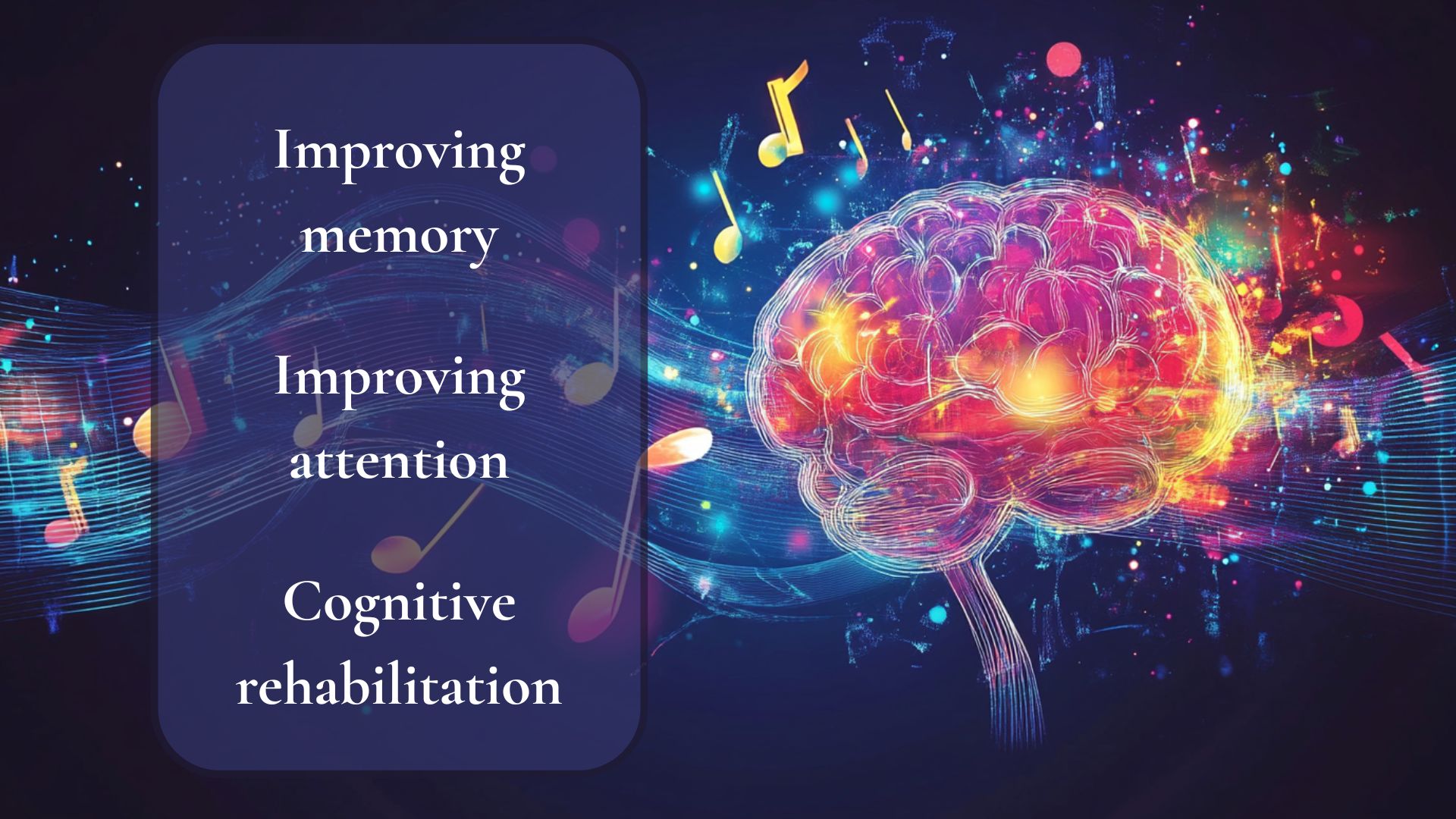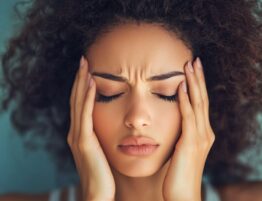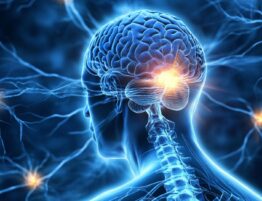Music is not just enjoyable — it’s also a powerful healing tool. For people with neurological conditions and serious illnesses, music aids recovery. It activates many areas of the brain at the same time, which causes an improvement in cognitive abilities. Music is an integral part of our lives that enhances mood. Today, music is considered an excellent tool for neurological recovery and improving overall health. It is a fantastic method for supporting brain activity and promoting recovery.
The emotional state of patients after music therapy becomes significantly better. Music is prescribed by doctors and used directly by patients. It is an ideal way to improve the brain after a stroke and traumatic brain injury. Music promotes the formation of new neural connections, which has a positive effect on the brain. Music has a great impact on brain function and improving its work. It enhances cognitive functions and improves mood. It provides both physical and emotional benefits.
Music Therapy as a Path to Neurological Healing
LoneStar Neurology offers high-quality care for patients with neurological diseases. We specialize in care and employ all necessary methods and treatment strategies. Today, therapy offers a path to neurological health improvement. Music therapy is a great way to improve the condition and strengthen health. Music becomes a part of people’s lives during rehabilitation periods. For recovery, it plays a vital role in maintaining cognitive abilities.
Music activates a wide range of brain areas and improves their function. It significantly impacts emotional state and memory. Music improves cognitive abilities by affecting the central nervous system. It enhances neuroplasticity and mental functions. Music also plays an important role in improving the coordination of movements. For neurological recovery, music can include the following aspects:
- Listening to preferred music.
- Playing musical instruments as a hobby to improve overall well-being.
- Singing as a way to express emotions.
- Dancing to music to improve coordination.
For mental and physical well-being, music therapy has great benefits. It helps improve recovery during the postoperative period and after stroke. It is also the best way to improve mental functions during Alzheimer’s and Parkinson’s disease. Music increases motivation and emotional well-being.
The Science Behind Neuroplasticity and Music
The science of neuroplasticity is valuable for improving health. This term refers to the brain’s ability to change structure in response to experiences and learning. During life, the process occurs constantly through the stimulation of active parts of the brain. Music is a great way to improve this process and achieve maximum results. Music therapy as a natural stimulant helps strengthen both physical and mental health.
While listening to music, dancing, or singing, brain areas are activated and strengthened. This activation process begins, improving overall condition. Over time, people experience improved thinking and memory. Emotional healing through music is equally important for overall improvement. Here is what music as a therapeutic treatment method affects:
- While listening to music, new neural connections are formed.
- The formation of neural networks is equally important for health.
- Improve overall well-being and retrain the brain to various triggers.
- Equally important is restoring functions lost due to neurological diseases.
Music is a great way to restore your health and improve it after injuries. For patients with neurological problems, music is the best addition to treatment. It helps restore lost functions and improve the most critical brain function. Music is not just a way of enjoyment and pleasure but a real treatment. For additional treatment and consultation, you can find us in multiple locations. You can call us or visit the centers in Sherman, Mansfield, and others.
Emotional Healing Through Therapeutic Interventions
Therapeutic interventions significantly impact emotional improvement and overall well-being. Through music, people feel more alive and experience positive emotions. Music is an excellent tool for the psycho-emotional state. Since ancient times, music has been an effective way to improve mood and promote relaxation. Music significantly impacts emotions and overall physical condition. While listening to music and playing various instruments, emotional healing occurs. This process promotes positive emotions that enhance cognitive function and mood.
- Music has a significant impact on emotions through stimulation of the limbic system. This brain area significantly affects emotions and mood. Specific vibrations from music help reduce anxiety and relax. This reduces stress and promotes natural healing. Music is a natural tool for producing dopamine. Natural therapeutic interventions help reduce stress and restore emotional balance.
- Music therapy helps people express emotions through music. People can sing and enjoy melodies, gradually reducing depressive symptoms and preventing complications. Over time, people notice decreased anxiety and improved mood. Music is used in rehabilitation centers to improve emotional state. Music therapy has a great impact on all patients to maintain mental health.
Enhancing Brain Function and Cognition with Music
Music is a great tool for improving the brain and cognitive abilities. It contributes to improved brain function and focuses on emotional recovery. This triggers dopamine release, which reduces stress and improves mood. For cognitive rehabilitation, music is a key stage as an additional treatment tool. Here is what music affects:
- Improving memory. Pleasant melodies help enhance the work of the hippocampus for memory formation. Music is the best way to improve memory. Pleasant melodies help reduce stress and provide enjoyment.
- Improving attention. Improving attention through music therapy is equally important. Music has an effect on the prefrontal cortex to improve attention and cognitive flexibility. Regular music listening helps minimize distractions. People can focus on specific details and maintain concentration.
- Cognitive rehabilitation. Music-based cognitive rehabilitation is equally important. People who have suffered significant injuries with neurological impact can engage in such therapy. Rhythm, melody, and words help restore speech and even movements. Music becomes a powerful catalyst for recovery and neuroplasticity. For additional treatment methods, you can meet our team. We make improved solutions for each patient with a personalized approach.
Music Therapy’s Impact on Motor Skills and Coordination
Music is an excellent tool for motor rehabilitation. People engage their brains while listening to pleasant melodies. The process focuses on controlling movements for quick recovery. People can improve their physical coordination over time.
- Listening to music for a specific time synchronizes movements with the brain. This process involves the brain adopting a stable rhythm for more effective movement. People can improve the timing and smoothness of their movements. The rhythmic combination of music and movement helps restore motor skills. Music’s ability to improve walking speed is equally significant. Music affects brain function through auditory signals. A steady rhythm helps people walk more confidently and with better coordination.
- Music helps to develop fine motor skills through stimulation in motor areas. Playing musical instruments to improve hand and body control is equally important. People with neurological conditions can improve fine motor skills by playing instruments. In rehabilitation centers, music provides unique emotional benefits for patients with severe injuries. It helps enhance and accelerate neurological recovery. Regular music listening and instrument playing increase motivation. People develop routines that they follow to improve their lives.
Integrating Music into Long-Term Recovery Plans
The integration of music with other treatment models is very important. Music is an additional tool for improving the emotional state. It has a great effect on the brain and helps to recover from severe injuries. Music therapy is an excellent addition to treatment and therapeutic methods to improve the outcome.
- Combination with physical therapy. Music, together with physical therapy, has improved results. People will enhance motor skills and gait. Physiotherapy is aimed at improving physical rehabilitation. Music excellently complements auditory development and movement coordination. The patient can do physical exercises and enjoy music.
- Combination with speech therapy. Speech therapy includes the development of speech areas. It helps restore communication skills. Music enhances cognitive rehabilitation and speech recovery. A comprehensive approach focuses on repairing damaged speech areas.
- Combination with psychological support. Combining music with psychological support is equally important. Psychotherapists and psychologists can counsel people with difficulties. Playing instruments or listening to music can enhance and accelerate this process. Music, together with psychological support, improves resilience and health
Music therapy, together with various methods, is the best way to achieve results. Together with medication and therapeutic actions, it plays an important role. Music can become a daily routine and a real hobby. While maintaining health, people enjoy music and achieve excellent results.












I've given up... the stress her office staff has put me through is just not worth it. You can do so much better, please clean house, either change out your office staff, or find a way for them to be more efficient please. You have to do something. This is not how you want to run your practice. It leaves a very bad impression on your business.
Please, leave your review
Write a comment: